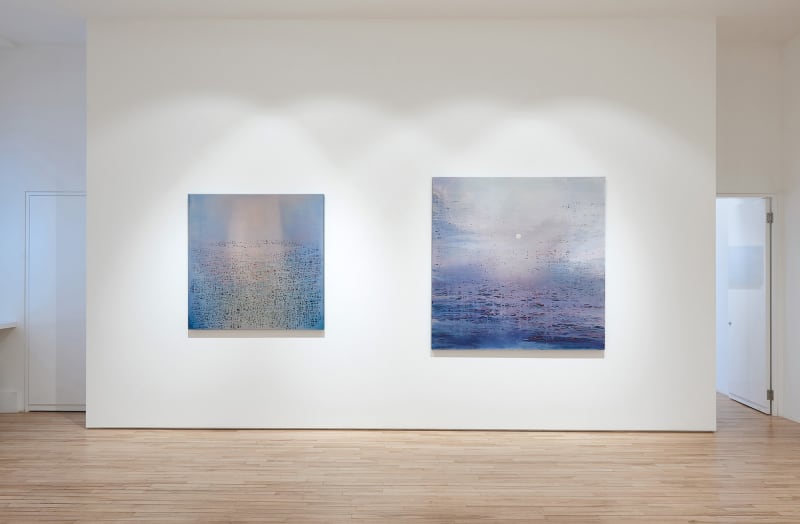Frestonian Gallery is delighted to present a newly completed body of work by Luke Elwes, that takes as its principal source a journey by the artist along the Ganges River begun in early 2018.
Beginning at Allahabad, after attending the Mela, and wending along the ever-changing course of perhaps the most venerated river in the modern world, through the holy cities of Varanasi and Gaya (Bihar), Elwes and his small travel party lived entirely on the river, camping alone on newly formed sandbanks and on the edge of the Ganga plain – ending his journey where the Ganges meets the sea, through the Sundarbans mangroves of the vast delta feeding into the Bay of Bengal, near Kolkata.
Along this route, taken at a stately pace by the usual modern standards, Elwes worked continuously, recording in sketches and watercolours the quality of the light, its play on the water, the nature of the atmosphere – brisk and full of a sense of the expansive nature of the landscape in the north, then humid and all- enveloping toward the South.
Into the materials used for these sketches and paintings Elwes worked traces of water and sediment from the river, as he sought to combine both vision and surface – the object and its manifestation into the ‘living evidence’ that would travel home with him to his studio in London, where the Ganga Series could begin to first settle in his mind’s eye, then arise again as a new creation in itself – both a distillation and reimagining of the journey.
Robert Delaunay, when describing the qualities and distinctiveness of Impressionism, described the movement as ‘...the birth of light in painting’ – and it is this that most resonates within Elwes’ own ties to that tradition of landscape painting. His work and his travels, or rather his experience of the different qualities of light and atmosphere across the globe are completely indivisible. The Australian and Iranian deserts, the Nepalese mountains, the quiet mist of the English coast and the solitude of the Atlas Mountains all bear their influence within the continuity of Elwes’ practice as a painter.
The Ganga Series is thus an examination & meditation on both an utterly unique environment and a universal one. The Ganges carries within it an infinitely rich history – named 108 different ways and existing in the minds of a billion souls as a god-form (the personification of ‘Mother
Gaṅgā’). It is however the quality of the light and sense of timeless expanse that seems here most affecting to the artist contemplating and approaching it as a subject – albeit with the vast
weight of cultural significance there as a steady undercurrent along the river’s 2,500km course.
These new paintings seek to, and succeed in, capturing the extraordinary moments that such a journey invokes. Moments where the surface darkens then shimmers back into life; moments where the water and the sky become completely as one in a delicately bruised haze of pinks and white sunlight. These are what Elwes captures, or rather finds, within a series of paintings in thinned and manipulated oils that at once manage to feel layered, dense and yet joyfully light. The finely balanced Ganga Series combines the specificity of the god-river itself, with a sense of the universal quality of being transported by an environment beyond any definite notion of time and place.
Notes on the artist
Luke Elwes was born in 1961 and now lives in London. His early years were spent in Iran, where the light and space of the mountains and desert were a formative influence. He studied at Bristol University and Camberwell School of Art between 1980 and 1985, and completed his Research Masters at London University in 2007.
His work has been exhibited widely in Europe and the US, with recent institutional exhibitions including the Palazzo Lanfranchi (Italy), the National Trust, Young Museum and Estorick Collection (UK) and the Albers Foundation (USA). His work is held in numerous private collections worldwide, as well as in public and corporate collections including: The Bayer Collection; Christie’s Contemporary Art Collection; National Trust Foundation for Art; Imperial College, University of London; Merrill Lynch Collection; Coopers & Lybrand; N M Rothschild; Deutsche Hypo Bank London; Hoares Bank Collection; Societe Generale, London; Electra Collection; Europa Collection, London.

